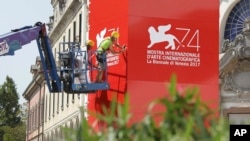The Venice Film Festival is kicking off the fall cinema season with searing drama, serious glamour and a crop of new movies vying for attention, awards and acclaim.
Thanks to its late-summer time slot, just ahead of rivals in Telluride and Toronto, the world's oldest cinema festival has become a key showcase for films hoping to dominate Hollywood's awards season. In recent years, Venice has been a launch-pad for Oscar winners including “Gravity,” “Birdman,” “Spotlight” and “La La Land.”
This year's edition opens Wednesday with Alexander Payne's “Downsizing,” a science fiction-tinged drama starring Matt Damon as a man who hopes to minimize his problems by shrinking himself.
Other films competing for the festival's top prize, the Golden Lion, include George Clooney-directed heist movie “Suburbicon”; Guillermo del Toro's fantastical “The Shape of Water”; Darren Aronofsky's secrecy-shrouded thriller “Mother!”; and Martin McDonagh's dark comedy “Three Billboards Outside Ebbing, Missouri.”
Here's what to watch for at the 74th Venice Film Festival, which runs to September 9:
Glamour galore
Unspooling in one of Italy's most ravishing cities, the festival takes style and celebrity very seriously. Among the stars who will be whisked across the Venice lagoon by boat to walk the Palazzo del Cinema red carpet are Clooney, a festival favorite who has a house on nearby Lake Como.
He'll likely be joined by pal Damon, who stars in both “Suburbicon” and “Downsizing,” which also features Kristen Wiig. Jennifer Lawrence is expected for the much-anticipated “Mother!”, which also stars Javier Bardem. The Spanish star should also be on hand alongside Penelope Cruz for the drug-lord biopic “Loving Pablo.”
An older generation of showbiz royalty will be well represented by stars including Judi Dench, Helen Mirren, Donald Sutherland and Michael Caine. Jane Fonda and Robert Redford star in the late-life romance “Our Souls at Night” and are being given lifetime-achievement awards by the festival.
Global Crises
Several films in the lineup tackle the conflicts and divisions convulsing the world.
Chinese artist Ai Weiwei's documentary “Human Flow” travels to 23 countries as it tries to put a human face on the vast migrations unfolding around the world. Paul Schrader, who wrote “Taxi Driver,” directs “First Reformed,” featuring Ethan Hawke as a minister wrestling with his faith and the specter of environmental catastrophe.
Israel's Samuel Moaz, director of acclaimed war drama “Lebanon,” returns with “Foxtrot,” another story of conflict and loss. From China, Vivian Qu's ``Angels Wear White'' centers on sexual assault in a small provincial town.
It hasn't escaped comment that Qu is the only female director among 21 filmmakers in the festival's main competition. Debates about diversity and inclusion in the movie business are a long way from dying down.
Thrills and chills
Once considered the preserve of B-movies, thrills have become respectable. The Venice competition brims with films that include elements of sci-fi, action and horror, including “Downsizing,” “The Shape of Water” and “Mother!”
Further jolts and shocks are promised by the Italian organized-crime series “Suburra”; S. Craig Zahler's bloody “Brawl in Cell Block 99,” starring Vince Vaughn; and a 3-D version of Michael Jackson's “Thriller,” screening alongside a 25th-anniversary documentary about the landmark video.
A changing industry
Technology and economics are transforming the film industry, and festivals like Venice are working hard to keep up.
Festival director Alberto Barbera has said he wants the lineup to provide “a perception of the future,” rather than “a snapshot of the present or a souvenir selfie of our contemporary cinema.”
One big change this year is the festival's first virtual reality competition, featuring 22 films and installations judged by a jury led by director John Landis. Barbera said VR, until recently considered little more than “the latest technological gimmick,” looked set to “become one of the most colossal investments” for the cultural industry.
With the way films are funded, made, distributed and watched all in flux, the taste-maker role played by festivals like Venice makes them more powerful than ever.
Schrader, who has been making films since the 1970s, said advances in technology had let him make “First Reformed” twice as fast and at half the cost of a movie made just 10 or 15 years ago.
“That's the upside of the enormous freedom we've been given by technology in film,” he said. “The downside is thousands of films are getting made now that no one wants to see.”
“The festivals are the new gatekeepers,” he added. “We need these festival structures to process this tsunami of product.”




